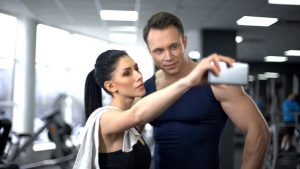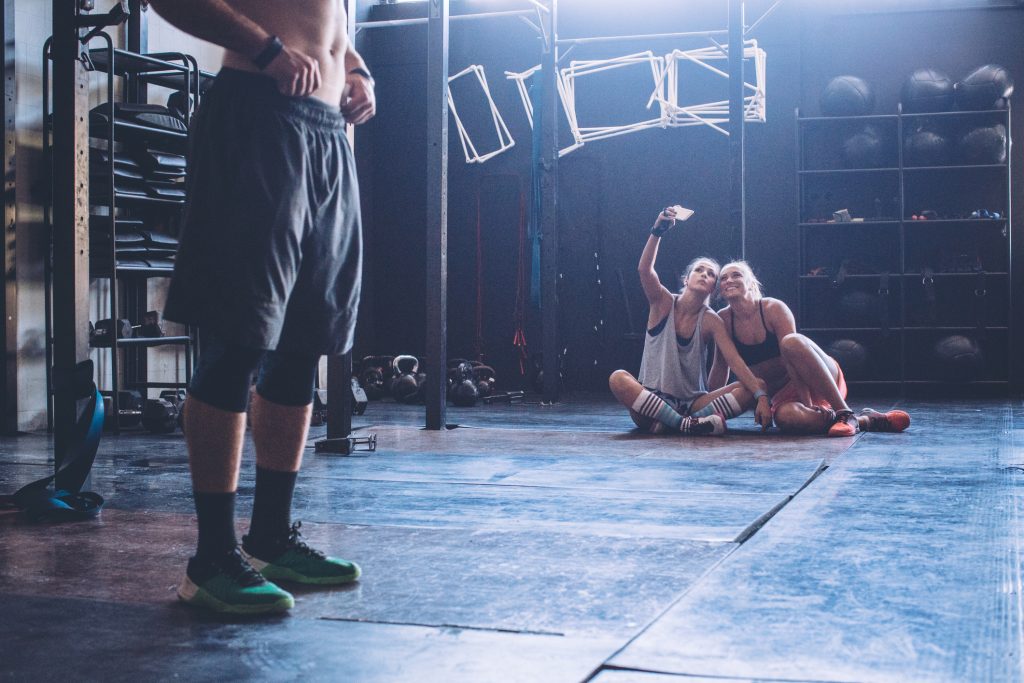Fitness and social media have both exploded in popularity over recent years, and in many ways, the two are the perfect match. Fitness posts consume social media feeds these days. You’ll have seen selfies of people in gyms pop up on your Facebook feed, and quotes on Twitter motivating you towards reaching your fitness goals. Body transformation photos get thousands of ‘likes’ on Instagram, and there are entire pages devoted to meal prep ideas. You might even start to question whether your workout actually happened if you didn’t post about it on social media. But is the combination of fitness and social media driving you towards your fitness goals, or away from them? Below, we discuss the pros and cons of social media when it comes to fitness, and whether your workouts are being affected by combining fitness and social media.
Fitness and Social Media: The Pros
1. Inspiration:
One of the key positive points about the social web, in general, is the ability to access a vast network of like-minded people. This is no different when it comes to fitness and social media. With one click, you can find people all around the world who are working towards similar fitness goals as you. Jim Rohn, the famous motivational speaker, stated that “you are the average of the five people you spend the most time with”. In other words, the people you associate with influence who you are. Many others support this notion, especially in the field of personal success. Leo Widrich of Lifehacker.com [url: https://lifehacker.com/5926309/how-the-people-around-you-affect-personal-success] agrees that“others around [myself] determine how I think, how I act, and ultimately how successful I will be”.
Before social media, it may have been hard to surround yourself with other people who are motivated and determined to reach fitness goals like you. But now, just entering a few hashtags into Instagram, or conducting a five-minute search of Facebook groups, can land you in the centre of a crowd of the right people – people who will inspire and motivate you to achieve better fitness.
How Your Social Network Can Inspire You
Let’s look at a couple of examples. Picture this – you’re away on holiday, and there’s no gym or anything other than a hotel room and a beach. You’re feeling pretty stodgy from that meal out you had last night, but there’s no place to work out. This might be an easy way for you to excuse yourself from training. But then you remember that video one of your Facebook friends posted of herself working out in her hotel room. This is all you might need to inspire you to start rearranging furniture and cracking on with that same workout you saw on the video.

Perhaps you’re really struggling to stick with your diet – those same old meal plans are getting really dull, and no matter how much you season that chicken breast, it’s just bland. Before you quit altogether and head to the nearest takeaway, you just so happen to scroll Instagram. That hashtag you searched – #mealprepideas – has served you up a delicious looking recipe. Inspired, you drop your car keys, and head to your kitchen – if they can make that chicken look that good in ten minutes, so can you, right?
2. Support:
Almost every one of us has taken part in a sports event as a kid, even if some of us were forced to do so. So let’s take our minds back to that crucial day when you’re lined up against all the other kids competing against one another for that coveted plastic medal. You’re up against a whole load of other schools, looking at that finish line, doubtful that you’d even finish that event. But then you spot your family in the crowd. Your mum is there, waving and smiling at you, and cheering you on as if you were in the Olympics. Just this bit of support probably spurred you on to get to the finish line.
It’s similar to fitness and social media. In ‘real life’, you wouldn’t go phoning all your friends and telling them you just increased your one rep max in the gym. Nor would you knock your parent’s door to announce you just beat your personal best on your morning jog. But it’s perfectly acceptable to post such things given recent social media fitness trends. Such posts are often received with amazing support. While the support doesn’t come in the form of people waving banners, clapping, and giving you plastic medals, often, in response, many people will ‘like’ your post. Some will even comment things like “well done!” or “OMG! Go you!”, followed up with a plethora of positive emojis.
How Likes and Comments Can Motivate You
Psychologists and sports coaches recognise the importance of praise and support from others in influencing motivation. Herzbergs’ Two Factor theory includes feeling recognised by others as a key ‘motivator factor’. These ‘motivator factors’ were identified through surveying 200 people and were found to be what keeps people satisfied and motivated to achieve their goals (Mindtools.com). Deci and Ryan’s self-determination theory also highlights encouragement and praise as a central part of extrinsic motivation. In sports team management, this is recognised this as a tool to lead athletes into to more goal-directed behaviour. (Sportlyzer.com).

In real life, unless you’re competing for a large scale event, it is pretty hard to find a network of supportive others who will motivate you towards your goals. But by combining fitness and social media, support from others is on tap in the form of likes and positive comments. By uploading a post to your social feed, you can access valuable feedback from people who are supportive, boosting your motivation to keep moving towards those fitness goals.
3. Accountability
A common trend in the fitness and social media scene is that of uploading ‘progress pics’, and accounts of your workouts. By updating your social profiles with your progress, workouts, and pictures for others to see, you’re keeping yourself accountable. Accountability is seen by psychologists as key to upholding performance.
For example, The Hawthorne Effect. This is a term first coined by psychologist Henry A. Landsberger back in the 1950s when he noticed that people in his experiments worked harder and performed better when observed by researchers (Economist.com). The same holds true in fitness. Anne Marie Faiola of website Best Day Ever describes the technique of using groups of likeminded people (accountability groups) to stay focused on fitness goals. She states that “accountability groups of all kinds hold your feet to the fire when it comes to achieving the goals you’ve set for yourself. By announcing those goals to a group, you’ll find it a LOT harder to get out of actually accomplishing those goals” (Bestdayever.com).

There are alternatives to using fitness and social media as a combination to keep yourself accountable. You could find a gym buddy to meet every time you train to make yourself turn up at the gym, or offer to walk a friend’s dog to get that cardio done. But by far the most accessible and reliable is to combine fitness and social media and update your social network on your workout progress. In this way, you can use the powerful combination of fitness and social media as a tool to stay goal focused and make sure you stay on track. After all, there’s little point in a progress pic without any progress, right?
Fitness and Social Media: The Cons
1. Distraction
Combining fitness and social media can really mess up your workout. For example, it’s tempting to scroll through Facebook for that thirty seconds rest you have during a high-intensity interval workout. But thirty seconds on social media can quite quickly turn into minutes. By that time, your high-intensity intervals will have transformed into – well – low intensity at best. It’s similar to weight training. If you’re using social media during rest between sets, you could end up resting too long. When that happens, your muscles can cool down, lessening the effect of the workout. Stopping for too long mid-workout and cooling down entirely might even result in injury. Your entire gym session could be therefore sabotaged by taking a ‘quick’ check of your social feed.
How Selfies Can Sabotage Your Workout
Another popular trend in fitness and social media is the ‘mid-workout selfie’. Looking for selfie opportunities is also distracting. It takes your focus away from your training. Even if it’s just in the back of your mind, if you’re out to take a selfie while you’re working out, some of your mental energy will be spent wondering which background might work, or whether there are any people around to look at you funny while you snap away. If this is you, you might find yourself losing count of reps, spending too long between sets, or generally not being ‘present’ while you train.

Maintaining focus is critical for workout effectiveness. In fact, Brian Mac, sports coach, points out that concentration is one of the primary areas of study in sports psychology (Brianmac.com). You’ll probably have already worked to minimise distraction in other areas. Your headphones will be on to shut out chatter and focus your mind with music. You’ll have cleared space in your day for your workout, so no other tasks are bothering your brain. But opening Facebook or ‘liking’ a photo on Instagram could undo all that effort and cause complete distraction from working towards your fitness goals.
2. Looking Great Rather than Feeling Great
You’ll know from checking yourself in the mirror before and after a workout, that the best training sessions don’t leave you looking picture perfect!
Where social media is concerned, there is a lot of emphasis on looking great. This can sway you towards thinking this is all-important. In fact, if you still look your best after you have worked out, it probably means you didn’t push yourself. Not many people who are killing their goals in the gym are selfie-ready after their training.

Focusing too much on looking the part to please social media crowds can take time. This leaves less time left over for your workout. Your new gym leggings might look great, but taking too much time to choose which sports top will match in a photo can take valuable time away from your training. We all have busy lives, and most of us can’t afford to spend more than an hour or two in the gym. If you don’t stay focused on your workout, it’s easy for your fitness time to turn into fitness and social media time.
Focusing on Your Looks Can Ruin Your Form
Some of the most effective exercises are also not the most graceful when performed correctly. If you are making an exercise video for posting on social media, you might be tempted to adjust your form to what looks good. But this is not necessarily what feels right, or what is most effective.
Let’s take cable kickbacks, for example. This glute exercise is regularly featured in exercise videos posted in the fitness and social media scene. When performing these, arching your back might look graceful for a social media video. But doing this engages the complete wrong muscles. Rounding your back slightly isn’t going to look as flattering, but this is the way to get a real glute burner out of this exercise. If when you’re working out, you’re focusing on what looks great, instead of what feels great, you’ll be most likely wasting your time in the gym.
3. Unrealistic Expectations
Fitness and social media in combination can be a great source of motivation. Looking at other’s progress pictures, and seeing updates of people who’re psyched to try out their new workout programme, can be really inspiring. However, the posts getting the most attention are usually extreme cases. These set us up for unrealistic expectations. As psychologist C. Snow states, unrealistic expectations damage our motivation ‘because they set us up for failure’ (Psychcentral.com).
Let’s take the social media trend of ‘body transformation’ photos. Essentially, these combine two photos depicting someone’s fitness progress in a ‘before and after’ fashion. There are hundreds and thousands of these posted, so to catch a viewer’s attention, the before and after pictures have to be shockingly different.

However, what you won’t see are all the ‘in the middle’ photos between the before and after. If you could see these, you’d see all the ups and downs the person’s physique went through before they got to the ‘after’. The off days, the bad weeks, the times when they didn’t feel progress was happening at all. This is a realistic account of what fitness progress truly looks like. Images that look only slightly different aren’t going to shock people into liking and commenting. So you don’t see the mid-way-through stages in before and after photos. This might lead you to believe that the progress you’re making just isn’t good enough.
Real Fitness Progress Has Ups and Downs
Let’s be real about something else, too. Progressing in fitness is sometimes hard. Workouts aren’t always going to be the ‘best workout EVER’. You’re not always going to feel ‘super pumped about the new diet plan!’. When it comes to fitness and social media though, the positive, super-energetic, happy updates get more attention. So these are what people post. You don’t see many people updating their feeds with ‘broke the diet today. Feel a bit hopeless about it all. I’ll start again tomorrow’, or ‘This workout is getting quite boring. Perhaps I should change my routine.’ The truth is, even top fitness influencers with thousands of followers go through these times.
There’s nothing wrong with being positive. Unfortunately, though, this is the only side you’ll see while you scroll your social media feed. So this is what you might expect to feel all the time. In this way, fitness and social media can be really demotivating. There are bumps and troughs as well as high times on anyone’s fitness journey. It is important to embrace all these times as normal. If you expect pure joy and motivation every day, it’ll be easy to be disappointed. Setting your expectations too high will only lead to feelings of failure.
Conclusion: Is Social Media and Fitness a Good Combination?
We’ve now covered some key pros and cons of how social media affects fitness. Combining fitness and social media can be a powerful motivator. It can also be a source of support. It allows you to surround yourself with people who inspire you to progress. However, fitness and social media can be a lethal mix when it comes to motivation. It all depends on the way you use it.
To sum up, a quick list of do’s and don’ts:
Fitness and Social Media Dos:
- Combine fitness and social media to find like-minded people to inspire you.
- Use social media as a source of support. Treat those likes and comments like your mum and dad cheering for you on sports day back in school.
- Use social media and fitness to keep yourself accountable. Post regular progress updates about your workouts to ensure you stay goal focused.
Fitness and Social Media Don’ts:
- Make your fitness time into ‘fitness and social media time’. Workout time is for working out. Selfies and social updates can come after.
- Focus too much on image and pleasing the social crowd. Some of the best exercises look downright ugly when you do them right. And nobody is picture perfect if they’ve pushed themselves.
- Set your expectations too high. When you see that shocking body transformation photo, remember that progress takes time.
